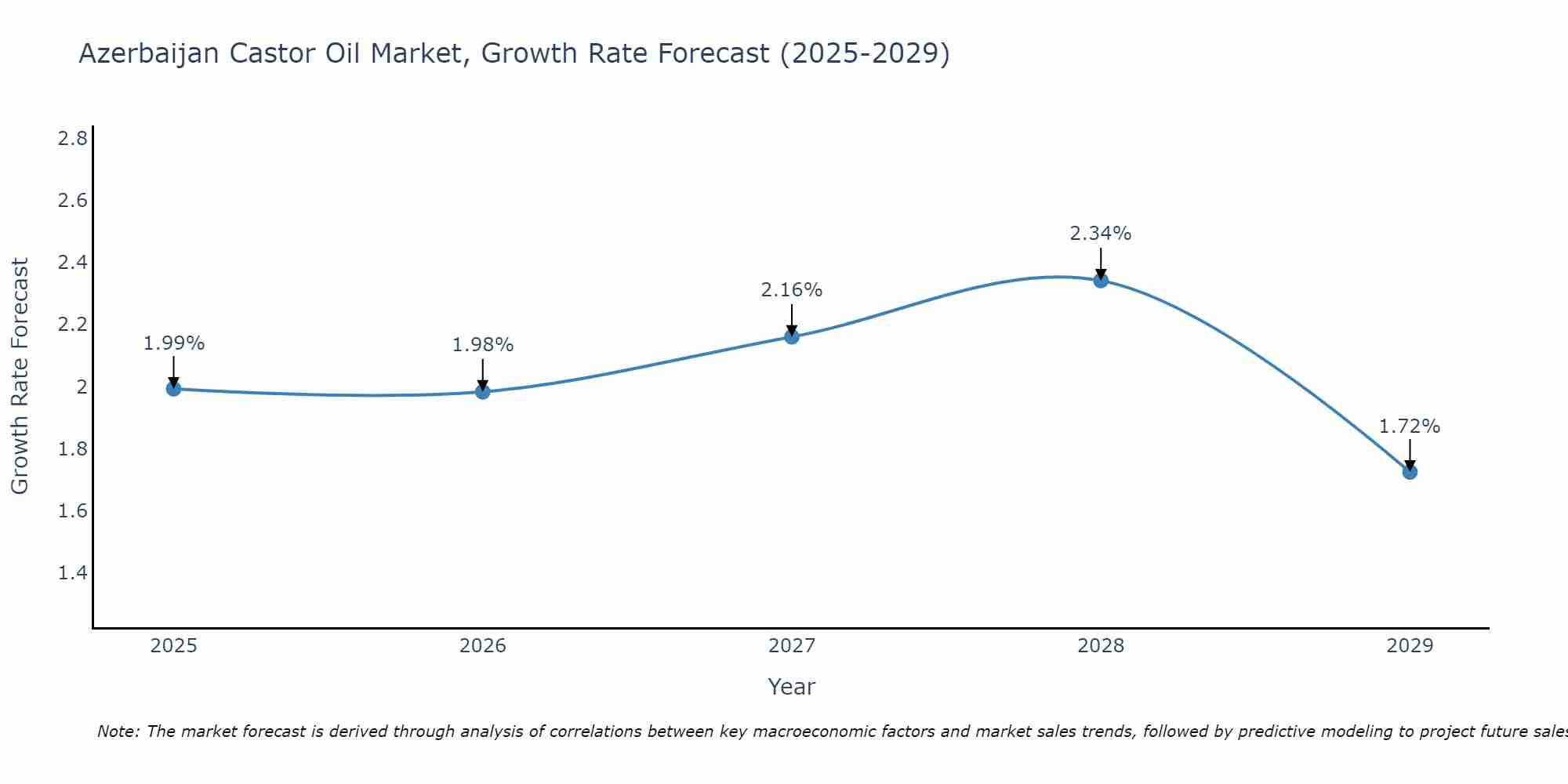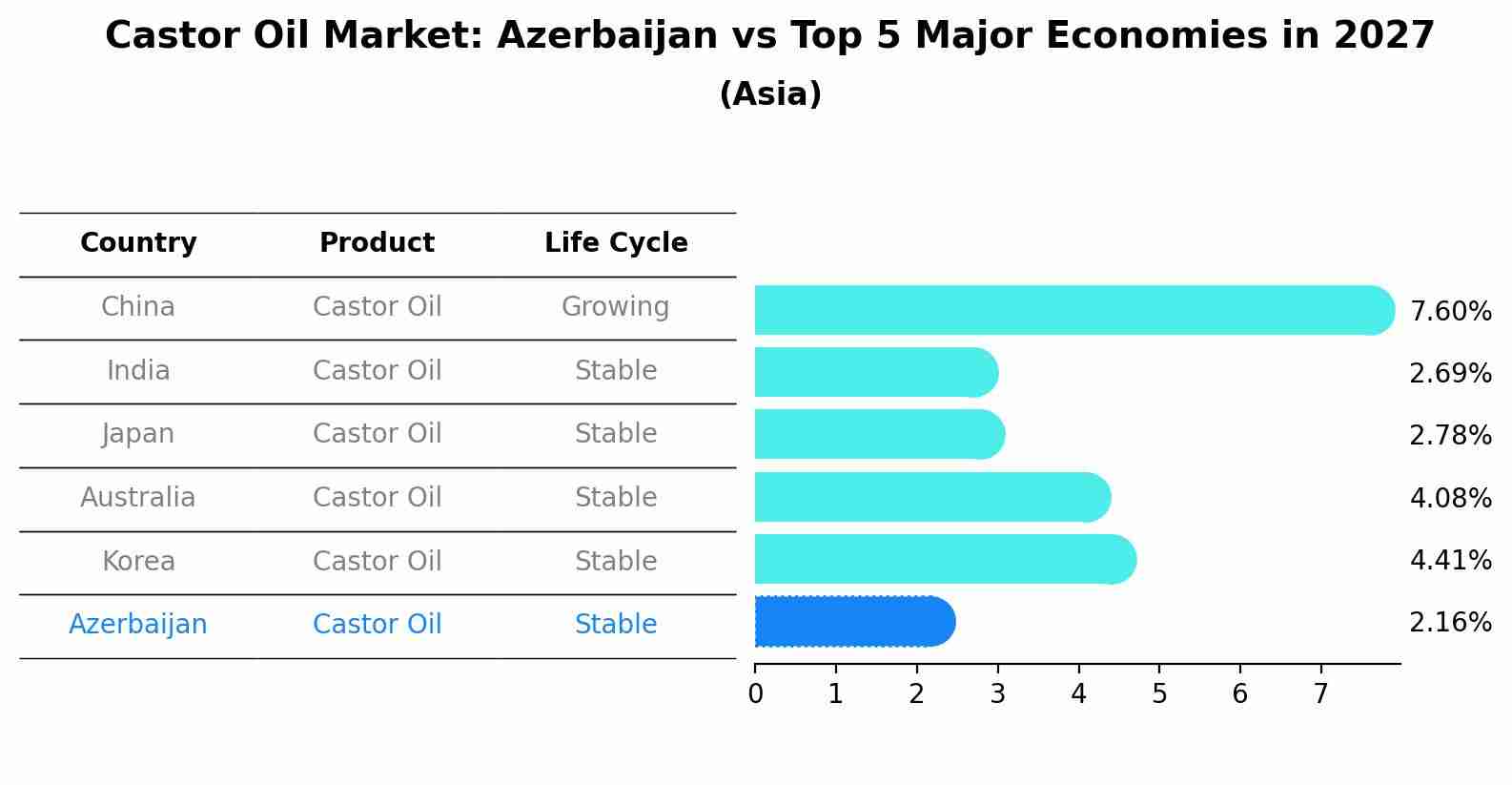Azerbaijan Castor Oil Market (2025-2031) Outlook | Industry, Value, Analysis, Companies, Revenue, Size, Share, Trends, Growth & Forecast
| Product Code: ETC410093 | Publication Date: Oct 2022 | Updated Date: Apr 2025 | Product Type: Market Research Report | |
| Publisher: 6Wresearch | Author: Shubham Padhi | No. of Pages: 75 | No. of Figures: 35 | No. of Tables: 20 |
Azerbaijan Castor Oil Market Size Growth Rate
The Azerbaijan Castor Oil Market is projected to witness mixed growth rate patterns during 2025 to 2029. Starting at 1.99% in 2025, the market peaks at 2.34% in 2028, and settles at 1.72% by 2029.

Castor Oil Market: Azerbaijan vs Top 5 Major Economies in 2027 (Asia)
The Castor Oil market in Azerbaijan is projected to grow at a stable growth rate of 2.16% by 2027, highlighting the country's increasing focus on advanced technologies within the Asia region, where China holds the dominant position, followed closely by India, Japan, Australia and South Korea, shaping overall regional demand.

Azerbaijan Castor Oil Market Synopsis
The castor oil market in Azerbaijan is witnessing growth driven by the increasing demand for natural and sustainable ingredients in various industries, including cosmetics, pharmaceuticals, and lubricants. Castor oil is valued for its moisturizing, anti-inflammatory, and lubricating properties. Challenges such as limited domestic production and volatile prices of castor seeds may impact market dynamics. However, investment in agricultural practices, processing infrastructure, and product quality standards could support the growth of the castor oil market and promote value addition in the agricultural sector.
Drivers of the market
The castor oil market in Azerbaijan is influenced by factors such as the demand for renewable and sustainable ingredients in industries such as cosmetics, pharmaceuticals, and lubricants. Castor oil is valued for its moisturizing properties, medicinal applications, and industrial uses. Factors such as consumer preferences for natural products, product innovation, and government support for bio-based industries contribute to the growth of the castor oil market in Azerbaijan.
Challenges of the market
Challenges in the castor oil market in Azerbaijan include crop cultivation constraints, processing technology limitations, and market demand fluctuations. Castor oil production relies on suitable agricultural practices and processing facilities, which may face challenges in Azerbaijan due to climatic conditions or technological limitations. Additionally, market volatility and competition from alternative vegetable oils may affect the profitability of castor oil producers in the country.
Government Policy of the market
The government of Azerbaijan may have established policies to regulate and support the production and trade of castor oil within the country. These policies may include agricultural subsidies for castor bean growers, quality standards for oil extraction, and export promotion initiatives. Additionally, the government may provide assistance with research and development in castor cultivation techniques, processing methods, and product diversification efforts. Moreover, regulatory frameworks may be in place to ensure product quality, food safety, and compliance with international trade regulations.
Key Highlights of the Report:
- Azerbaijan Castor Oil Market Outlook
- Market Size of Azerbaijan Castor Oil Market, 2024
- Forecast of Azerbaijan Castor Oil Market, 2031
- Historical Data and Forecast of Azerbaijan Castor Oil Revenues & Volume for the Period 2021-2031
- Azerbaijan Castor Oil Market Trend Evolution
- Azerbaijan Castor Oil Market Drivers and Challenges
- Azerbaijan Castor Oil Price Trends
- Azerbaijan Castor Oil Porter's Five Forces
- Azerbaijan Castor Oil Industry Life Cycle
- Historical Data and Forecast of Azerbaijan Castor Oil Market Revenues & Volume By End Use for the Period 2021-2031
- Historical Data and Forecast of Azerbaijan Castor Oil Market Revenues & Volume By Pharmaceuticals for the Period 2021-2031
- Historical Data and Forecast of Azerbaijan Castor Oil Market Revenues & Volume By Lubricants for the Period 2021-2031
- Historical Data and Forecast of Azerbaijan Castor Oil Market Revenues & Volume By Paints for the Period 2021-2031
- Historical Data and Forecast of Azerbaijan Castor Oil Market Revenues & Volume By Soaps for the Period 2021-2031
- Historical Data and Forecast of Azerbaijan Castor Oil Market Revenues & Volume By Others for the Period 2021-2031
- Azerbaijan Castor Oil Import Export Trade Statistics
- Market Opportunity Assessment By End Use
- Azerbaijan Castor Oil Top Companies Market Share
- Azerbaijan Castor Oil Competitive Benchmarking By Technical and Operational Parameters
- Azerbaijan Castor Oil Company Profiles
- Azerbaijan Castor Oil Key Strategic Recommendations
Frequently Asked Questions About the Market Study (FAQs):
- Single User License$ 1,995
- Department License$ 2,400
- Site License$ 3,120
- Global License$ 3,795
Search
Thought Leadership and Analyst Meet
Our Clients
Related Reports
- Canada Oil and Gas Market (2026-2032) | Share, Segmentation, Value, Industry, Trends, Forecast, Analysis, Size & Revenue, Growth, Competitive Landscape, Outlook, Companies
- Germany Breakfast Food Market (2026-2032) | Industry, Share, Growth, Size, Companies, Value, Analysis, Revenue, Trends, Forecast & Outlook
- Australia Briquette Market (2025-2031) | Growth, Size, Revenue, Forecast, Analysis, Trends, Value, Share, Industry & Companies
- Vietnam System Integrator Market (2025-2031) | Size, Companies, Analysis, Industry, Value, Forecast, Growth, Trends, Revenue & Share
- ASEAN and Thailand Brain Health Supplements Market (2025-2031) | Strategy, Consumer Insights, Analysis, Investment Trends, Opportunities, Growth, Size, Share, Industry, Revenue, Segments, Value, Segmentation, Supply, Forecast, Restraints, Outlook, Competition, Drivers, Trends, Demand, Pricing Analysis, Competitive, Strategic Insights, Companies, Challenges
- ASEAN Bearings Market (2025-2031) | Strategy, Consumer Insights, Analysis, Investment Trends, Opportunities, Growth, Size, Share, Industry, Revenue, Segments, Value, Segmentation, Supply, Forecast, Restraints, Outlook, Competition, Drivers, Trends, Demand, Pricing Analysis, Competitive, Strategic Insights, Companies, Challenges
- Europe Flooring Market (2025-2031) | Outlook, Share, Industry, Trends, Forecast, Companies, Revenue, Size, Analysis, Growth & Value
- Saudi Arabia Manlift Market (2025-2031) | Outlook, Size, Growth, Trends, Companies, Industry, Revenue, Value, Share, Forecast & Analysis
- Uganda Excavator, Crane, and Wheel Loaders Market (2025-2031) | Strategy, Consumer Insights, Analysis, Investment Trends, Opportunities, Growth, Size, Share, Industry, Revenue, Segments, Value, Segmentation, Supply, Forecast, Restraints, Outlook, Competition, Drivers, Trends, Demand, Pricing Analysis, Competitive, Strategic Insights, Companies, Challenges
- Rwanda Excavator, Crane, and Wheel Loaders Market (2025-2031) | Strategy, Consumer Insights, Analysis, Investment Trends, Opportunities, Growth, Size, Share, Industry, Revenue, Segments, Value, Segmentation, Supply, Forecast, Restraints, Outlook, Competition, Drivers, Trends, Demand, Pricing Analysis, Competitive, Strategic Insights, Companies, Challenges
Industry Events and Analyst Meet
Whitepaper
- Middle East & Africa Commercial Security Market Click here to view more.
- Middle East & Africa Fire Safety Systems & Equipment Market Click here to view more.
- GCC Drone Market Click here to view more.
- Middle East Lighting Fixture Market Click here to view more.
- GCC Physical & Perimeter Security Market Click here to view more.
6WResearch In News
- Doha a strategic location for EV manufacturing hub: IPA Qatar
- Demand for luxury TVs surging in the GCC, says Samsung
- Empowering Growth: The Thriving Journey of Bangladesh’s Cable Industry
- Demand for luxury TVs surging in the GCC, says Samsung
- Video call with a traditional healer? Once unthinkable, it’s now common in South Africa
- Intelligent Buildings To Smooth GCC’s Path To Net Zero


















